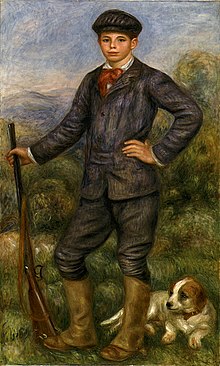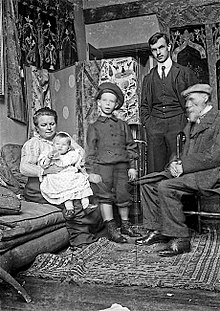Jean Renoir
Jean Renoir (born September 15, 1894 in Montmartre ( Paris ), France , † February 12, 1979 in Beverly Hills , California , USA ) was a French film director , screenwriter and actor . As a representative of the poetic realism of the 1930s in French film, Jean Renoir created important film classics such as The Great Illusion and The Rules of the Game . In a survey of film critics by Sight & Sound magazine , Renoir was ranked 4th among the greatest directors of all time. In 1975 Renoir was awarded an honorary Oscar for his life's work.
Life

Jean Renoir was the second son of Aline Victorine Charigot and the famous painter Pierre-Auguste Renoir . His brother was the actor Pierre Renoir , his nephew the cameraman Claude Renoir .
As a child, Jean Renoir lived in the south of France, where he and the other family members became preferred models of his father's painting. The father's financial success ensured that as a young man Jean could be educated in the best schools. However, the training was ended by the First World War . Jean Renoir joined the French army and became a fighter pilot. After World War I, he worked as a ceramic artist but was drawn to the development of the film, particularly the work of DW Griffith and Charlie Chaplin .
In 1924 he directed for the first time. His then wife Catherine Hessling appeared in six films until 1928 , whom he met in 1915 as his father's last model and married in 1920. In 1937 he made the film that many consider to be his best work - alongside La règle du jeu (1939): La grande illusion . In Germany the film was from Joseph Goebbels as French propaganda prohibited, as of Benito Mussolini in Italy, after the film on the Film Festival of Venice had received a price. This was followed by another box office success, La Bête Humaine, based on a novel by Émile Zola with the very popular Jean Gabin in the leading role. With these films, Jean Renoir is one of the representatives of poetic realism and had a great influence on Italian neorealism in the post-war years.
During the Second World War , the 45-year-old Renoir joined the film service of the French army. After the German invasion and occupation (1940) he fled France to the United States, where he now worked in Hollywood . In 1943 he was the director and producer of the anti-fascist propaganda film This Land Is Mine with Maureen O'Hara and Charles Laughton . Two years later he made The Southerner , the film considered by many to be his best work in America and for which he was nominated for an Oscar for directing. The lesser-known films In den Sümpfen (1941) and The Maid's Diary (1946) are equally of decisive importance for Renoir's American work . The Woman on the Beach (1947), his last American film, was a commercial failure and remained critically controversial in later years. Perhaps the most notable production of Renoir's late days was Dejeuner sur l'herbe (1959). Shot entirely on his father's last estate in southern France, the film develops a quasi pantheistic view of nature in the field of tension of the coming knowledge and information society.
In 1962 Jean Renoir wrote a biography entitled Renoir, my father . In 1964 he was elected to the American Academy of Arts and Sciences . In 1975 he received an Oscar for Lifetime Achievement, and that same year a retrospective of his work was shown at the National Film Theater in London . In 1977 he was awarded the Legion of Honor by the French government .
Renoir died on February 12, 1979 at the age of 84 in Beverly Hills. His body was transferred from the USA to France, where he was buried next to his family in the cemetery of Essoyes ( Département Aube ).
Filmography
- 1924: Une vie sans joie directed together with Albert Dieudonné
- 1925: The daughter of water (La Fille de l'Eau)
- 1926: Nana
- 1927: Sur un air de Charleston
- 1928: The little girl with the sulfur sticks (La Petite marchande d'allumettes)
- 1928: The slacker (Tire-au-flanc)
- 1928: Le Tournoi dans la Cité
- 1929: Le Bled
- 1931: On purge bébé
- 1931: The Bitch (La Chienne)
- 1932: Chotard & Co. (Chotard et Cie)
- 1932: La Nuit du carrefour
- 1932: Boudu - saved from the waters (Boudu sauvé des eaux)
- 1933: Madame Bovary
- 1935: Toni
- 1936: A country party (Une partie de campagne)
- 1936: The crime of Mr. Lange (Le Crime de Monsieur Lange)
- 1936: Life is ours (La Vie est à nous)
- 1936: Night asylum (Les Bas-fonds)
- 1937: The great illusion (La Grande illusion)
- 1938: The Marseillaise (La Marseillaise)
- 1938: Beast Man (La Bête Humaine)
- 1939: The rules of the game (La Règle du jeu)
- 1941: In the Swamp Water
- 1943: This is my country (This Land Is Mine)
- 1944: Salute to France
- 1945: The Man from the South (The Southerner)
- 1946: Diary of a Chambermaid (The Diary of a Chambermaid)
- 1947: The woman at the beach (The Woman on the Beach)
- 1951: The Power (The River)
- 1952: The golden body (La carrozza d'oro)
- 1954: French Can Can (French Cancan)
- 1956: White daisies (Elena et les Hommes)
- 1959: Breakfast in the countryside (Le Déjeuner sur l'Herbe)
- 1959: The will of Dr. Cordelier (Le Testament du Docteur Cordelier)
- 1962: The corporal in the noose (Le Caporal épinglé)
- 1970: Le Petit théâtre de Jean Renoir
Fonts (selection)
- My father Auguste Renoir (OT: Renoir ). Diogenes, Zurich 1981, ISBN 3-257-22425-7 . (Diogenes, 4th edition 2004, ISBN 978-3257224252 .) French: Pierre-Auguste Renoir, mon père . Gallimard 1999, ISBN 978-2070372928 , (paperback).
- My life and my films. (OT: Ma vie et mes films ). Diogenes, Zurich 1992, ISBN 3-257-22452-4 .
literature
- André Bazin : Jean Renoir . Translation by Udo Feldbusch. S. Fischer, Frankfurt 1980, 1984, ISBN 3-596-23662-2 . (Preface: J. Renoir; Filmography 1924–1969; Ed. & Introduction: François Truffaut ). Hanser, Munich 1977, ISBN 3-446-12430-6 .
- Célia Bertin: Jean Renoir, cinéaste. Gallimard, Paris 1994, ISBN 2-07-053264-X .
- Excerpt in Karl Stoppel, (Ed.): La France. Regards sur un pays voisin. A collection of texts on French studies. Series: RUB Fremdsprachentexte 9068. Reclam, Stuttgart 2008, ISBN 978-3-15-009068-8 , pp. 250ff., (French).
- Isabelle Farcat and Heiner Gassen (eds.): The common films: Scenes of a friendship. Lotte Reiniger , Carl Koch , Jean Renoir. CICIM, Munich 1994, ISBN 3-920727-09-6 .
- Heiner Gassen (Ed.): Jean Renoir and the thirties. Social utopia and aesthetic revolution. Revue CICIM, No. 42, Munich 1995, ISBN 3-920727-11-8 .
- Lisa Gotto (Ed.): Jean Renoir . (= Film concepts 35), edition text + kritik , Munich 2014, ISBN 978-3-86916-367-3 .
- Michael Lommel and Volker Roloff (eds.): Jean Renoirs Theater / Films . Fink, Munich 2003.
- Roger Viry-Babel: Snapshot "La marseillaise" or: The transfigured revolution in: Heiner Gassen (Red.), Marcel Ophüls : Mercenary Documentary Film & Alain Resnais : "I want to go home" & Jean Renoir: "La marseillaise" . In: Revue pour le Cinema français CICIM , No. 29. Translation by Karola Bartsch. Center d'Information Cinématographique de l'Institut Français de Munich (CICIM) & Münchner Filmzentrum, Munich 1990, ISSN 0938-233X , pp. 119–135.
documentary
- Jean Renoir, French film legend. (OT: Quand Jean devint Renoir. ) Documentary film, France, 2017, 54:22 min., Script and director: Alexandre Moix, production: arte France, Les Films d'ici, INA , first broadcast: April 30, 2017 on arte, Summary of ARD .
Web links
- Literature by and about Jean Renoir in the catalog of the German National Library
- Jean Renoir in the Internet Movie Database (English)
- Grand Illusion & The River (Engl.)
Individual evidence
- ↑ Time Encyclopedia, Volume 12, page 216, ISBN 3-411-17572-9
- ^ The Critics' Top Ten Directors. ( Memento from June 23, 2011 in the Internet Archive ) In: British Film Institute (BFI)
- ↑ This refers to the 1930s.
| personal data | |
|---|---|
| SURNAME | Renoir, Jean |
| BRIEF DESCRIPTION | French film director |
| DATE OF BIRTH | September 15, 1894 |
| PLACE OF BIRTH | Montmartre , Paris, France |
| DATE OF DEATH | February 12, 1979 |
| Place of death | Beverly Hills , California, USA |

